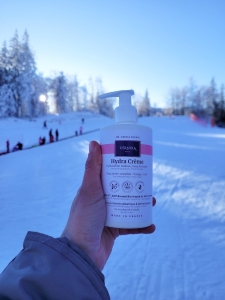Reading Time: mins
Skin conditions such as warts and corns are not just aesthetic concerns; they also impact our mobility and quality of life. Growing interest in more natural solutions has led us to explore the beneficial properties of Ashitaba extract. This medicinal plant, native to Japan, holds significant potential thanks to its unique compounds. In this article, we detail how Ashitaba extract could represent a natural solution for people suffering from warts and corns.
The search for natural alternatives to combat skin discomfort is booming. Ashitaba extract stands out for its recognized medicinal properties, particularly in Japan, where it is consumed for its health benefits. Here, we examine the impact of this extract on specific conditions such as warts and corns, drawing on preliminary studies and testimonials to better understand its potential.
Exploring natural solutions for the treatment of skin conditions is crucial in an age of reduced dependence on synthetic chemicals and drugs. Ashitaba is attracting attention for its active compounds and its anti-inflammatory and anti-infectious effects. This article aims to provide an in-depth understanding of Ashitaba and explore its ability to improve skin health naturally.
Plantar warts and corns are widespread skin problems with distinct origins and treatments, but they share a common formation mechanism linked to pressure and friction. Warts, in particular, are induced by a viral infection (human papillomavirus), and occur mainly on the soles of the feet. Corns, on the other hand, result from an accumulation of dead skin following continuous pressure, inducing pain and discomfort.
Although benign, these skin conditions can have a major impact on people's daily lives, affecting their mobility and comfort. Prolonged use of unsuitable footwear, as well as inadequate hygiene and foot care, can aggravate these conditions. The growing interest in natural alternatives can be explained by the potential limitations and side-effects of conventional treatments.
Distinguishing between warts and corns is fundamental in guiding the choice of appropriate treatment. While warts often require interventions to eliminate the virus responsible, corns can be treated by pressure-reducing methods and improving friction conditions. In this context, the efficacy of natural solutions such as Ashitaba extract deserves to be examined from a scientific and practical angle.
Ashitaba is renowned for its medicinal and nutritional properties. Among its key components, chalcones, polyphenolic compounds, have demonstrated anti-inflammatory and anti-infectious effects. These properties could play a crucial role in combating skin infections such as warts, and could help reduce the accumulation of dead skin responsible for the formation of corns.
Ashitaba's virtues are not limited to its direct impact on the skin. It also promotes cell regeneration and boosts the immune system, which can contribute to better defense against various skin conditions. Incorporating Ashitaba extract into skin care could therefore offer multi-faceted benefits beyond the treatment of warts and corns.
Scientific research, although in its infancy, is providing promising indications of Ashitaba's potential. Preliminary studies have revealed its efficacy in inhibiting the growth of certain bacteria and modulating inflammatory responses. These theoretical findings support the idea that Ashitaba extract could prove an effective natural complement to specialized treatments for skin conditions.
Ashitaba extract stands out as a promising skin care ingredient, offering a new natural avenue for individuals seeking to treat conditions such as warts and corns. As the scientific community continues to explore this plant's potential, incorporating Ashitaba extract into skin care routines may represent an interesting complementary solution. However, it remains essential to consult a healthcare professional before introducing new elements into your skin care routine. Vernixa remains committed to promoting natural, science-backed skincare solutions for your skin's well-being.
All Rights Reserved | Tous Droits Réservés GTIN Compliance Hydra Lavant | GTIN Compliance Hydra Crème



